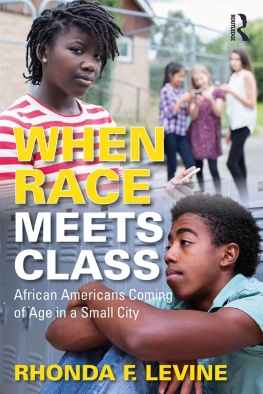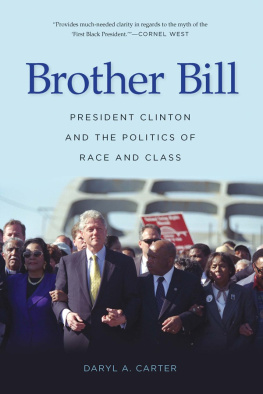Thank you for buying this ebook, published by NYU Press.
Sign up for our e-newsletters to receive information about forthcoming books, special discounts, and more!
Sign Up!
About NYU Press
A publisher of original scholarship since its founding in 1916, New York University Press Produces more than 100 new books each year, with a backlist of 3,000 titles in print. Working across the humanities and social sciences, NYU Press has award-winning lists in sociology, law, cultural and American studies, religion, American history, anthropology, politics, criminology, media and communication, literary studies, and psychology.
Talking at Trenas
New York University Press
New York and London
2001 by New York University
All rights reserved
Library of Congress Cataloging-in-Publication Data
May, Reuben A. Buford, 1965
Talking at Trenas : everyday conversations at an African American
tavern / Reuben A. Buford May.
p. cm.
Includes bibliographical references and index.
ISBN 0-8147-5671-9 (acid-free paper)
ISBN 0-8147-5672-7 (pbk. : acid-free paper)
1. African AmericansRace identity. 2. African Americans
Attitudes. 3. African AmericansSocial life and customs. 4. Middle class
United StatesAttitudes. 5. Middle classUnited StatesSocial life and
customs. 6. Social interactionUnited StatesCase studies. 7. United
StatesRace relationsCase studies. 8. RacismUnited States
Psychological aspectsCase studies. 9. Bars (Drinking establishments)
IllinoisChicago. 10. Chicago (Ill.)Race relations.
I. Title.
E185.625 .M35 2001
305.896073dc21 2001001495
New York University Press books are printed on acid-free paper,
and their binding materials are chosen for strength and durability.
Manufactured in the United States of America
10 9 8 7 6 5 4 3 2 1
CONTENTS
Chapter One
Trenas: A Study in Tavern Culture
Chapter Two
Work and the Tavern
Chapter Three
Television Interaction and Race
Chapter Four
Talking about Race
Chapter Five
Marriage, Women, and the Tavern
Chapter Six
Sex Talk and Innuendo
Chapter Seven
The Paradox
ACKNOWLEDGMENTS
From the summer of 1994 to the winter of 1996, I did fieldwork in a neighborhood tavern I call Trenas. I had originally begun my research in neighborhood taverns as part of a larger comparative study of race and social organization. This comparative study, under the direction of William Julius Wilson and Richard P. Taub at the University of Chicago, examined the lifestyles, attitudes, and behaviors of residents in four racially and ethnically distinct neighborhoods in order to determine the extent to which each of the neighborhoods residents achieved the communal goals of social organization. What grew out of my participation in this larger study was an interest in how patrons in racially segregated neighborhood taverns talked specifically about race and contemporary issues generated by television. I wanted to get some sense of how African Americans, within the context of a safe haven, made sense of their lives in a society that emphasizes race and racial identity. As an African American myself, I found this question of not only sociological but also personal interest.
This book is an ethnographic study of middle-class African Americans in the relaxed setting of a neighborhood tavern. I explore the underlying themes related to the everyday lives of Trenas patrons. By immersing myself in the daily routines of leisure at Trenas, I learned how patrons talk conveyed the subtle ways in which issues of race penetrated everyday life. Talking, drinking, and laughing with the patrons while using a sociological eye gave me an opportunity to look more deeply into the taken-for-granted processes by which so many African Americans understand race.
There are many who deserve thanks for supporting me during my young professional career. William Julius Wilson provided guidance and an environmentthe Center for the Study of Inequality at the University of Chicagofor my intellectual growth. Richard P. Taub, Edgar Epps, and Kenneth Watson provided invaluable direction, while allowing me to grow as an individual scholar. Many of the ideas developed in this book were reformulated on the basis of hours of informal dialogue with my colleagues and friends Alford Young, Jolyon Wurr, Mary Pattillo-McCoy, Sandra Smith, Mignon Moore, Pamela Cook, Sarita Gregory, Ray Reagans, Fred Hutchinson, Carla OConnor, and Peter Schneeburger. My skills as an ethnographer were developed and refined through discussions with Erin Augis, Patrick Carr, Monica Escurra, Chenoa Flippen, Jennifer Johnson, Maria Kefalas, Jennifer Pashup-Graham, and Monica Ibanez.
Others who provided moral and intellectual support along the way include Andrew Abbott, Linda Waite, Jeanine Hildreth, George Wimberly III, Lori Hill, Julian Go, Nick Young, Ezra Zuckerman, Jeffery Morenoff, and Sharon Hicks-Bartlett. When I needed a break from the rigors of writing or help working through some of my ideas, I turned to my cybergroup think tank of friends. I owe Ray, Pegs, Mary, Ma P, Sheri, Nikki, Ada, Shelby da playa, and Michael many thanks for helping me work out the kinks. My colleagues at the University of Georgia, especially Woody Beck, Linda Grant, Jim Dowd, Barry Schwartz, Michael Hodge, and Gary Alan Fine (now at Northwestern), also provided feedback and encouragement. I also owe thanks to the University of Georgia womens basketball team and head coach Andy Landers, and the Clarke Central High School boys basketball team and head coach Billy Wade. They helped me maintain a social life away from my work.
I believe that family support is most important when one sets out to achieve goals. This is probably because I have a supportive family. First, I thank my wife, Lyndel, who provided moral support throughout my graduate studies and subsequent research. I also thank my stepdaughter, Tamarra, and my daughter, Big Ol Gina May, for the simple distractions from sociology that they provided. I owe other members of my family thanks for their continued support, especially my mother, Gwendolyn May-Barlow, my stepfather, Michael Barlow, my youngest brother, Khary, and my middlebruh, Tim. My best friend, Vic, provided me a life away from research and Bob Thurman provided me with solutions to many everyday problems. I love you all.
.
Finally, this study could not have been completed without the help of the patrons in Trenas. I would like to thank them for willingly sharing with me intimate details about their personal lives. While I cannot thank them individually, I must recognize their contributions to my personal knowledge and my sociological knowledge. It is my hope that, by understanding their lives, we can better understand our own.




